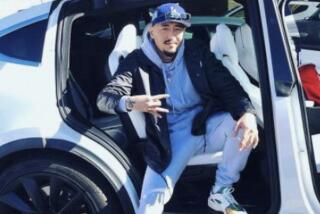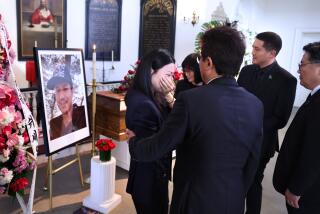Report weaves dark tale of gunman’s past
- Share via
WASHINGTON — Seung-hui Cho drifted in silence through four years of high school and his first year in college, all but lost in the throng.
But as a sophomore, he discovered his place in life: He would be a writer.
During the summer break, he had spent hours writing manuscripts. He changed his major to English. And he submitted a book proposal to a New York publisher, “sort of like Tom Sawyer except that it’s really silly and pathetic,” he explained in an e-mail to one professor.
Rather than provide a path out of his troubled world, though, his writing ambition brought disappointment, followed by a downward spiral of bizarre behavior. It culminated in a bloody massacre on the Virginia Tech campus in which Cho killed 32 students and teachers before turning the gun on himself.
The shootings April 16 prompted universities across the country to tighten their security alert systems.
In the most comprehensive report to date of the shootings, a panel appointed by Virginia Gov. Timothy M. Kaine faulted the decision by authorities not to issue a campuswide notification after the first two students were killed in a dorm, two hours before the deadly rampage in the classrooms of Norris Hall.
The report also faulted the Virginia Tech Police Department for prematurely concluding that the initial shooting was an incident of domestic violence, spending hours tracking and interviewing “a person of interest” who was not involved, while Cho regrouped and reloaded for the later, deadlier assault.
“The failure to give notice in a prompt fashion was a clear error,” Kaine said in a news conference discussing the results of the four-month study. “That could have made a difference in this particularly tragedy, but it probably wouldn’t have averted the tragedy.”
Kaine said that what really might have made the difference was “connecting some of the mental health dots.” The report noted that school officials and others did not share information on Cho’s behavior because they believed federal privacy laws banned any disclosure of a student’s mental health records. Kaine said that may have been too strict an interpretation of the law.
Tracy Littlejohn, a Virginia Tech graduate from Simi Valley whose cousin Erin Peterson was killed by Cho, said Thursday that she wished more could have been done to alert students after the first shooting. “I cannot say that Erin would not have died that day, but she would have at least had the information about her safety.” Littlejohn said. “She was sitting in French class. She had no idea.”
Virginia Tech President Charles W. Steger said it was “painful to hear the blunt and, in some cases, critical findings” of the report. But, he added, “no one at this university had any foreknowledge of his mental health problems.”
Laid out in painstaking detail by the panel, which interviewed more than 200 individuals and pored over thousands of pages of documents, the tortured saga of Seung-hui Cho reads like a life-long primal scream.
The signs of trouble in Cho’s life were clear almost from the beginning.
Born in Seoul, South Korea, Cho developed whooping cough as a baby, and doctors suspected a hole in his heart. When he was 3, a medical procedure performed on him, believed to be an echocardiograph or a cardiac catheterization, was so traumatic that Cho developed a lifelong fear of being touched.
When he was 9, the family moved to Fairfax County, Va., so that Cho and his older sister, Sun-kyung, would have access to a better education. Despite problems communicating -- no one in the family spoke English when they arrived -- Cho seemed to be adjusting. He enrolled in a tae kwon do program, watched television and played video games such as Sonic the Hedgehog.
But he said very little. Sometimes his mother would get so frustrated at his silence she would shake him. If asked to respond to a visitor, he would “develop sweaty palms, become pale, freeze and sometimes cry.”
By the time he was in the sixth grade, he had grown withdrawn and uncommunicative. Teachers recommended therapy, and the Chos “overcame several obstacles to get their son the help he needed,” alternating absences from their dry cleaning business to drive him to weekly sessions.
In the eighth grade, an art therapist noticed that his paintings were growing darker. After the murders at Columbine High School in 1999, Cho wrote what officials deemed “a disturbing paper” for his English class expressing thoughts of suicide and homicide, saying he wanted “to repeat Columbine.” The school contacted Cho’s sister, who reported the incident to their parents. Cho was sent to a psychiatrist.
The doctor diagnosed Cho as having depression and “selective mutism” -- an anxiety disorder marked by the inability to speak in certain social situations. He prescribed an antidepressant, paroxetine, which Cho took for almost a year. The drug appeared to help. He seemed to be in a good mood, looked brighter and smiled more.
The doctor stopped the medication, and Cho stopped going to counseling. “There is nothing wrong with me,” he told his parents.
He graduated from Westfield High School with a 3.5 grade-point average and SAT scores of 540 for verbal and 620 for math. A high school guidance counselor strongly recommended a small college, cautioning that Virginia Tech, with 26,000 students, was too large. But Cho insisted and was accepted. Westfield sent his academic records, but not reports of his special-ed needs. They never told Virginia Tech officials of his history.
At first, the family thought he was adjusting well to college. He asked for a new roommate after the first one left their room messy with beer cans. Cho seemed excited by his studies in business information technology. He also took classes in biology, math, communications, political science and poetry.
In his sophomore year, he moved off campus and decided to switch his major to English. Writing to Lucinda Roy, the chairwoman of the department, he asked for the names of a publisher or agent who could help get him published. “My novel is relative[ly] short,” he e-mailed. “Sort of like Tom Sawyer except that it’s really silly and pathetic, depending on how you look at it.”
He was not a gifted English student. One of his English professors gave him a D-, another a C+.
Late in the school year, his sister found a rejection letter from a New York publisher. She consoled her brother by telling him all writers have to work at their craft for a long time before they are published.
By the fall, in his junior year, he moved back to the dorms, and signs of trouble came quickly. Once, when roommates brought him along to a party, he used a knife to stab at the carpet in a female student’s room.
In Nikki Giovanni’s poetry writing class, he wore mirrored glasses and a hat pulled down to obscure his face. He used his cellphone to take pictures of other students. He wrote a satire about an animal “massacre butcher shop.” Other students stopped coming to the class, and Giovanni contacted Roy and insisted that Cho be withdrawn. Roy agreed and began tutoring him one-on-one.
When Cho refused to go to counseling, Roy notified university officials, the counseling center and the Virginia Tech police. The university’s Care Team, which reviews students with problems, discussed his case.
Throughout the fall, female students complained about Cho’s behavior. In November 2005, a female resident filed a report with the Virginia Tech Police Department saying Cho had “annoying” contact with her on the Internet, by phone and in person. Police interviewed him, but she declined to press charges.
He sent an instant message to one of his suitemates saying, “I might as well kill myself.” The student reported the statement to the police, who took him for screening by a social worker. She recorded her findings, saying that he was mentally ill and an imminent threat. She recommended involuntary hospitalization.
Cho was admitted to Carilion St. Albans Psychiatric Hospital. A staff psychiatrist, based on Cho’s denial of past mental health problems, found “no indication of psychosis, delusions, suicidal or homicidal ideation.” Shortly after 11 a.m. the next morning, a special judge ordered follow-up treatment as an outpatient. Cho was discharged at 2 p.m. and kept his counseling appointment at 3 p.m. The report from that session is missing.
In the spring, problems continued. Cho was mute in class, his papers dark and troubling. Professor Robert Hicok was concerned, and consulted with Roy, the department chairwoman. In one of his papers for Hicok, who gave him a D+, Cho wrote “I hate this! I hate all these frauds! I hate my life. . . . This is it. . . . This when you damn people die with me.”
As 2007 began, Cho placed an online order for a handgun, picking it up from the pawnbroker across the street from the campus. He rented a van for a month, in which he videotaped his rantings, later sent to NBC.
As winter made way for spring, he took shooting practice at a firing range and bought more guns and ammunition, complying with the state’s 30-day waiting period. A background check found no record of mental health issues.
On the night of April 15, Cho made his usual Sunday evening call to his parents. He asked how they were, and he seemed his regular self, showing no outward signs of distress. He told his parents he did not need any money. They told him they loved him.
The next morning he was dead, along with 32 others.
--
Times staff writer Molly Hennesey-Fiske contributed to this report
--
On latimes.com Text of the report For the complete text of the review panel’s report on the Virginia Tech shootings, go to latimes.com/vatech
More to Read
Sign up for Essential California
The most important California stories and recommendations in your inbox every morning.
You may occasionally receive promotional content from the Los Angeles Times.










